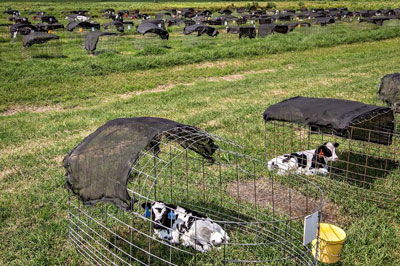June 17, 2013 | News & Information
There is a nondescript building at 7780 Northwest 53rd Street in Doral, not far from the Miami International Airport, that over the past 25 years has housed thousands of monkeys destined to suffer and die in research and testing laboratories. There are no signs to identify the business. The only hints as to what went on inside its grey walls are security cameras, empty cages stored alongside the building, and a foul smell.

When monkeys are imported to the United States, federal regulations require that they be isolated for at least 31 days to screen for tuberculosis and other infectious diseases. Beginning in the mid-80s, the building in Doral was used to quarantine monkeys imported by animal dealer Matt Block and his company Worldwide Primates. At any one time, hundreds of monkeys from China, Mauritius, Indonesia, St. Kitts & Nevis and other countries were confined in small cages inside the building.
In December 1994, as Block was appealing his conviction for smuggling endangered wildlife, the building was sold to Paul Houghton, the owner of another importer of monkeys for use in experimentation and testing, Primate Products, Inc. (Matt Block entered prison in 1995.)
Today, the protest group South Florida Smash HLS announced that Primate Products has closed its monkey quarantine facility in Doral. For the first time in more than 25 years, the building is empty.
ARFF hopes that the closure of the quarantine facility is a sign that South Florida is becoming inhospitable for companies involved in the cruel animal research industry.
June 14, 2013 | News & Information
This week, the Colombian Congress approved a ban on wild animals in circuses. Bill sponsor Senator Juan Córdoba Suárez explained that the purpose of the ban “is to protect animals and citizens who can be exposed to possible attacks or transmissible diseases, as well as to respond to the cry of a great majority of Colombians who seek protection, respect and good treatment of animals.”
Colombia’s President is expected to sign the law, which gives circuses two years to comply with the new legislation.
Colombia will become the fourth country in Latin America to ban wild animals in circuses, joining Bolivia, Paraguay and Peru.
There is a large Colombian American community in Florida. ARFF is hopeful that Colombia’s decision will be heard by political leaders in Florida.
Send a quick note to the Consulate General of Colombia and thank them for the country’s compassionate step on behalf of animals:
Consulate General of Colombia in Miami
Email: cmiami@cancilleria.gov.co
May 31, 2013 | News & Information
An article in Saturday’s Palm Beach Post about Larson Dairy, one of Florida’s largest dairy farms, included this photo of dozens of young calves, confined individually in small wire hutches covered with a piece of fabric for shade. Why aren’t these calves with their mother? Because humans are drinking her milk!

On large dairy farms, calves are taken from their mother shortly after birth and fed artificially. (Female calves are raised as “replacements” for adult cows who are sent to slaughter when their production declines.) The calves spend the first weeks of their lives cut off almost completely from contact with other cows. Not all calves survive the stressful, unnatural, forced separation from their mother.
When ARFF visited a Florida dairy farm we found one poor calf dead and covered in flies inside a wire hutch. A video of the disturbing scene can be found on ARFF’s YouTube page.
The Palm Beach Post article did include some good news: Milk sales are declining! Among the reasons, “Soy, almond, and rice milks and other alternatives are cutting into market share.”
Visit ARFF’s website to learn more about the dairy industry.
May 9, 2013 | News Releases
For Immediate Release: May 9, 2013
(Tallahassee, FL) — Animal advocates are hopeful that Florida Governor Rick Scott will once again reject state funding to promote alligator products.
The Animal Rights Foundation of Florida (ARFF) has sent a letter to Gov. Scott urging him to veto $250,000 that has been included in the 2013-2014 budget for “alligator marketing.” Budget items 1435 ($100,000) and 1756 ($150,000) are intended to promote alligator meat, leather and by-products.
In 2011, Gov. Scott vetoed $150,000 that was budgeted for alligator marketing.
“We are urging Gov. Scott not to waste state funds to promote alligator products,” said Don Anthony, ARFF’s Communications Director. “The State of Florida should not be in the business of marketing the meat and skin of this unique Florida animal.”
On alligator farms in Florida, thousands of these magnificent animals are killed each year. Farmed alligators often live in dirty, crowded, unnatural conditions in concrete or metal tanks. Disease is commonplace, and slaughter is inhumane.
A copy of ARFF’s letter is available upon request.
# # #
May 7, 2013 | News & Information
Yesterday, an Animal Control Officer in Port St. Lucie rescued a raccoon who had been caught in an illegal leghold trap. The poor animal’s front paw had to be amputated (a report by Fox 29 News features a photo of the raccoon’s horrific injuries).
 In 1972, Florida banned the use of steel-jaw leghold traps, but they are still widely used by trappers in other states to catch raccoons, coyotes, bobcats and other fur-bearing animals. When an animal steps on a leghold trap, the trap’s jaws slam closed on the animal’s limb. The animals efforts to escape often lead to serious injuries.
In 1972, Florida banned the use of steel-jaw leghold traps, but they are still widely used by trappers in other states to catch raccoons, coyotes, bobcats and other fur-bearing animals. When an animal steps on a leghold trap, the trap’s jaws slam closed on the animal’s limb. The animals efforts to escape often lead to serious injuries.
If you ever hear someone defend trapping as humane, or if you’ve ever considered purchasing a coat with fur trim, please remember the sad photo of this raccoon.



